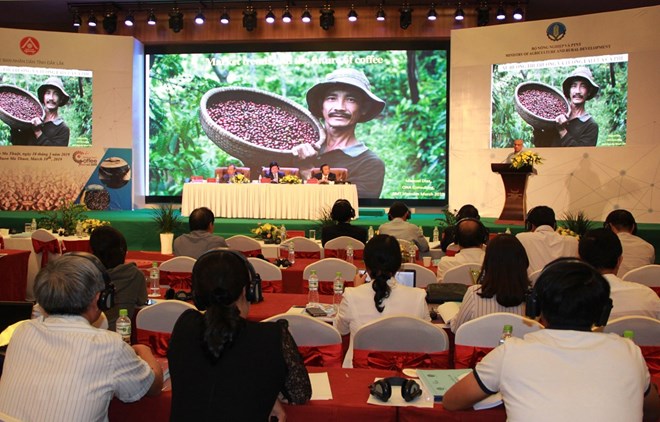Vietnam has potential to produce speciality coffee
Thứ Hai, 11/03/2019, 19:22
Coffee production areas across many Vietnamese provinces, including Dak Lak, Dak Nong, Son La and Lam Dong, are endowed with crop varieties, weather conditions and soils that are suitable to develop specialty coffee, according to experts.
 |
|
Scene at the workshop (Photo: VNA) |
The statement was made at a workshop held in Buon Ma Thuot city, the Central Highlands province of Dak Lak on March10, with participating officials, experts and producers discussing ways to develop Vietnamese speciality coffee.
Vietnam has about 664,000 hectares of coffee plantations. It sells coffee to 80 countries and territories worldwide for more than 3 billion USD annually, accounting for 14 percent of global market share and 10.4 percent of global export value. However, only 7 percent of exported Vietnamese coffee products are processed.Speciality coffee refers to the entire process from farmer to cup using single origin coffee of unique flavour profiles gained from a special geographic microclimate. Growing this kind of coffee could offer a path to higher earnings.
Vietnam should work to prove that the country not only owns abundant sources of good coffee but also has speciality coffee, stressed Deputy Minister of Agriculture and Rural Development (MARD) Le Quoc Doanh at the workshop.
Currently, the country has 50 speciality coffee producers, which annually supply 200 tonnes of the product. Some of them have invested in labs, quality assessment and vocational training.
Chairman of the Buon Ma Thuot Coffee Association Trinh Duc Minh said speciality coffee should be listed as a national high-quality goods, while incentives and mechanisms that encourage production and investment, and connect supply and demand are needed.
Vice Chairman of the Lam Dong People’s Committee Pham S shared that the province has selected Di Linh and Lam Ha to develop speciality coffee with a focus on applying advanced technologies, defining market segments and advertising.
Mauel Diaz. P, a Mexican coffee expert, said Vietnam is the world second biggest robusta exporter but the value it has earned remains modest.
The expert recommended the country build a stricter standard for local production, and boost quality based on technology application rather than fertilisers. Speciality coffee remains new to Vietnamese, thus its promotion in the domestic market should be made a priority.
Deputy Minister Doanh said the MARD is committed to supporting local authorities and businesses in building a development roadmap for speciality coffee. He urged farmers and firms to take part in the process, focusing on quality improvement and product promotion.
VNA

